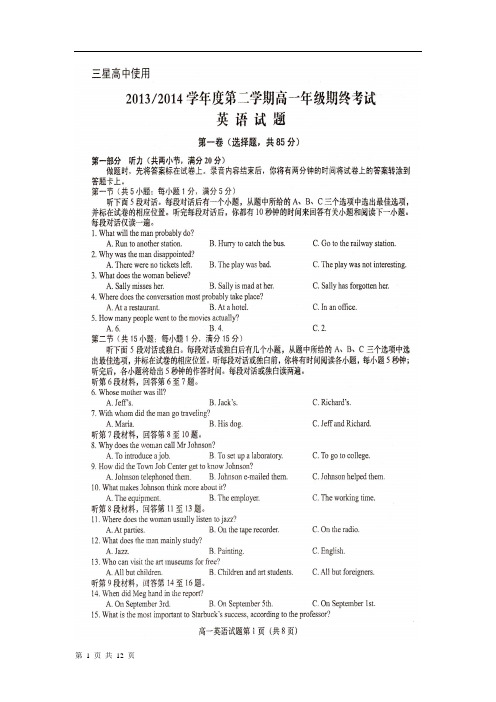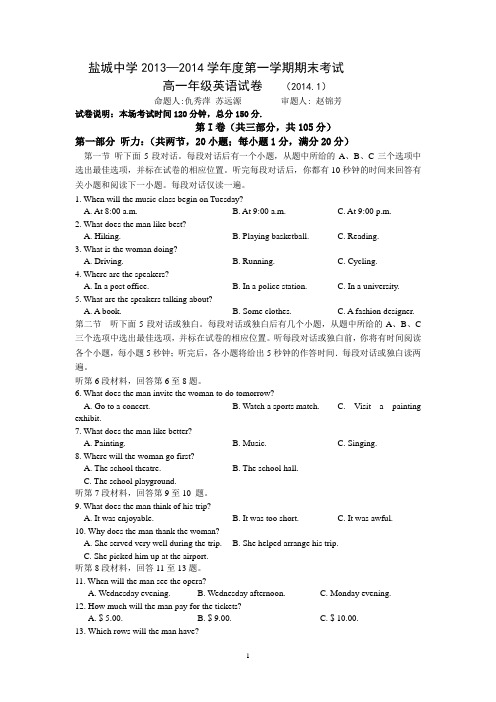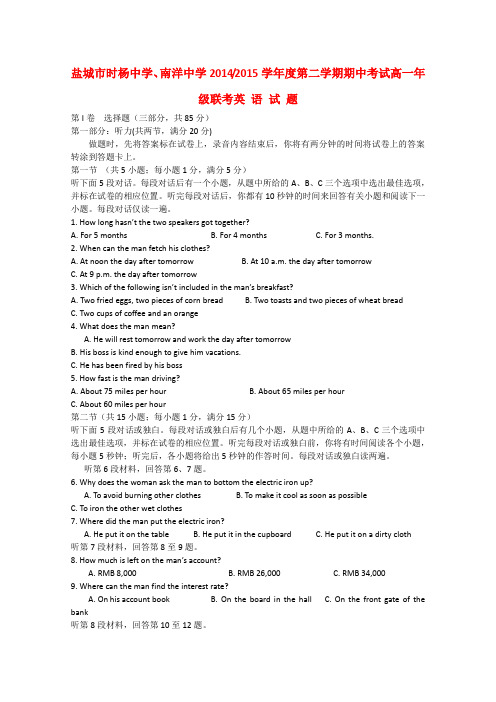江苏省盐城中学2013-2014学年高一下学期期中考试 英语
- 格式:doc
- 大小:156.00 KB
- 文档页数:12

江苏省盐城中学2013-2014学年高一英语下学期期中试题试卷说明:本场考试时间120分钟,总分150分.第I卷〔共三局部,共105分〕第一局部听力 (共20小题, 每一小题1分,总分为20分)第一节听下面5段对话。
每段对话后有一个小题,从题中所给的A、B、C 三个选项中选出最优选项, 并标在试卷的相应位置。
听完每段对话后, 你都有10秒钟时间来回答有关小题和阅读下一小题, 每段对话仅读一遍。
1. What will the speakers probably do?A. Go to the movies.B. Continue to paint.C. Watch a movie on TV.2. What is the woman likely to do?A. Study in another school.B. Go to Italy to learn Italian.C. Teach Italian as a part-time job.3. What does the woman like doing as a teenager?A. Listening to music.B. Playing basketball.C. Going hiking.4. How will the speakers go to the airport?A. By bus.B. By underground.C. By car.5. Why did the woman refuse to go to the cinema with Bob?A. She didn’t like him.B. She had quarreled with him.C. She was too tired that day.第二节听下面5对话, 每段对话或独白后有2至4个小题, 从题中所给的A、B、C三个选项中选取出最优选项, 并标在试卷的相应位置。

三星高中使用高一英语试题参考答案及听力录音稿听力1—5 BABBC 6—10 ABAABC 11—15 CBBBA 16—20 CCBCA 单项填空21—25 ACABD 26—30 DBCDA 31—35 BDABC完形填空36—40 BADDC 41—45 CBACD 46—50 ABDCA 51—55 BDCAB 阅读理解56—58 BCD 59—62 CABD 63—66 BACD 67—70 CBDA课文内容填空71. commercial 72. wealthy 73. believed 74. joy 75. boundaries76. match 77. otherwise 78. injured 79. alive 80. allowing 任务型阅读81. Tips/Suggestions/Advice 82. judged 83. or/otherwise 84. Name85. familiar 86. read 87. close 88. Relax 89. different90. careful书面表达One possible version:Advertisements are part of modern life. Everyone must face them. However, different people have different opinions about them.Many students think that advertisements are bad. Firstly, advertisements always try to persuade people to buy what they actually don‟t need. Secondly, commercial ads are always suggesting that their products are the best. Lastly, some advertisements even tell lies to cheat consumers, making people fall for them and suffer great losses sometimes.Some others take a different attitude, and set out the reasons for the belief that advertisements can be beneficial to people. To start with, public service advertisements are usually meant to educate people about safety, health, etc. Secondly, commercial advertisements can give us a lot of information about products. Last but not least, they promote competition and sales, which benefit consumers.In my opinion, we should be smart about advertisements and let them be at your service: think about why you should do the things the advertisements suggest, or buy the product or the service the advertisements promote.听力录音材料Text 1M: Could you tell me when the next bus leaves for Yorkshire station?W: The next bus leaves in five minutes. If you run, you might catch it.Text 2M: We were going to the theater on Saturday. But unfortunately the play we were most interestedin is all sold out.W: That‟s too bad. Why don‟t you try to get tickets for a daytime or for another night?Text 3M: Do you have any reason to believe that Sally is not very pleased with you?W: Yes, today when I saw her, she wouldn‟t even stop to talk with me.Text 4W: Your room is 504, on the fifth floor. Here is your key. The porter will bring up your luggage. M: Thank you. And could I arrange to be called at half past six tomorrow morning, please?W: All right.Text 5M: Six of us started to the movies, but only one-third of us actually made it to the theater.W: Then you could have asked four more people.…Text 6M: Hello, Maria.W: Hello, Jack. I heard that you went on trip last month.M: That‟s right. I was away for ten days, just to have a change.W: Oh, ten days! How wonderful! Did you go alone or with your friends?M: I was planning to go together with Jeff and Richard, but they both couldn‟t make it in the end. W: What happened?M: Jeff‟s mother was ill, so he must stay at home to take care of her. Richard got a new task and couldn‟t spare the time.W: I see. And what did you do with your dog while you were away?M: Oh, he‟s a good traveler, as long as he gets a chance to play.Text 7W: Hello, may I speak to Mr Johnson, please?M: Speaking. Who‟s calling, may I ask?W: This is the Town Job Centre. We‟ve received your e-mail and we are quite interested in you. M: Can you tell me more about it? What kind of job?W: Well, a college wants to find some laboratory assistants. It‟s the kind of job you would like to do, as we can see from your e-mail.M: Yes, I did put that in my e-mail.W: Yes. They also want a person who knows how to operate the computer, so we think you are just the right kind of person for the job.M: What about the pay and the work hours?W: I‟m coming to that. The pay they have offered is satisfactory, but the work hours are a bit changeable. Sometimes early in the morning, sometimes late in the afternoon.M: Well, I am interested in it, but I need some more details so that I can talk it over with my wife. W: Why don‟t you come over here tomorrow?M: OK, I‟ll do that. See you tomorrow then. Bye!Text 8W: Do you like pop music, Carl?M: Yes, I‟m crazy about pop music. And you?W: Just a little. But I‟m a jazz fan. I usually listen to a lot of good jazz on the radio. Do you listen to any of it?M: Sometimes, when I‟m not working.W: What are you studying here anyway, Carl?M: I‟m doing a year at painting, and I‟m also trying to learn some English in my spare time.W: I know nothing about painting, but your English is excellent. You must have been very well taught.M: You‟re joking!W: No, I‟m not, honestly. There isn‟t much we can teach you. You are supposed to visit lots of art museums in London.M: Yes, I hope so. The National Exhibition, the British Museum and many others.W: Well, since you‟re an art student, you won‟t have to pay the entrance ticket like the rest of us. M: I didn‟t know anybody paid.W: They didn‟t use to, but the government decided recently that we have to pay for our art.Personally, I think it‟ll cost them more to collect the money than they‟ll get back in return. But still, children will get in free as before.Text 9W: Professor Hopkins. May I have a word with you?M: Sure, Meg. What‟s up?W: I got a C for my report. I am wondering what I have done wrong. You know I have put a lot of time and energy to the report.M: Well, Meg. I understand you have made much effort on the report. Maybe that‟s why you are two days late to hand in the report. The due day is September 3rd.W: Yes, Professor. I am sorry about that.M: And this report is about the success of the Starbucks Coffee. In your report, you have mentioned the company‟s management, selections of stores and service. But I am surprised that you didn‟t mention anything about its coffee. It‟s a coffee shop, Meg. Isn‟t the taste of its coffee the most important thing to its success?W: Yeah, I guess I have made a mistake by leaving it out.M: And figures are important, too. You also need to add an actual figure such as the monthly sales. W: You are quite right, Professor.M: And why not do more research, look for some figures and write the report again.W: Are you giving me another chance, Professor?M: Seems like I am.Text 10The development of the English language took a giant step just nine years before the death ofWilliam Shakespeare. Three small British ships crossed the Atlantic Ocean in 1607. They landed in an area that would later become the southern American state of Virginia. They began the first of several British colonies. The name of the first small colony was Jamestown.Over the course of the following years, people in these new colonies began to call areas of their new land by words borrowed from the native people they found living there. For example, many of the great rivers in the United States are taken from Native American words. The Mississippi, the Tennessee, the Missouri are examples.Other Native American words included “moccasin”, the kind of shoes made of animal skin that Indians wore on their feet. This borrowing or adding of foreign words to English was a way of expanding the language. The names of three days of the week are good examples of this. The people from Northern Europe honored three gods with a special day each week for each one. The gods were Odin, Thor and Freya. Odin‟s day became Wednesday in English, Thor‟s day became Thursday and Freya‟s day became Friday.。

盐城中学2013—2014学年度第一学期期末考试高一年级英语试卷(2014.1)命题人:仇秀萍苏远源审题人: 赵锦芳试卷说明:本场考试时间120分钟,总分150分.第I卷(共三部分,共105分)第一部分听力:(共两节,20小题;每小题1分,满分20分)第一节听下面5段对话。
每段对话后有一个小题,从题中所给的A、B、C三个选项中选出最佳选项,并标在试卷的相应位置。
听完每段对话后,你都有10秒钟的时间来回答有关小题和阅读下一小题。
每段对话仅读一遍。
1. When will the music class begin on Tuesday?A. At 8:00 a.m.B. At 9:00 a.m.C. At 9:00 p.m.2. What does the man like best?A. Hiking.B. Playing basketball.C. Reading.3. What is the woman doing?A. Driving.B. Running.C. Cycling.4. Where are the speakers?A. In a post office.B. In a police station.C. In a university.5. What are the speakers talking about?A. A book.B. Some clothes.C. A fashion designer. 第二节听下面5段对话或独白。
每段对话或独白后有几个小题,从题中所给的A、B、C 三个选项中选出最佳选项,并标在试卷的相应位置。
听每段对话或独白前,你将有时间阅读各个小题,每小题5秒钟;听完后,各小题将给出5秒钟的作答时间.每段对话或独白读两遍。
听第6段材料,回答第6至8题。
6. What does the man invite the woman to do tomorrow?A. Go to a concert.B. Watch a sports match.C. Visit a painting exhibit.7. What does the man like better?A. Painting.B. Music.C. Singing.8. Where will the woman go first?A. The school theatre.B. The school hall.C. The school playground.听第7段材料,回答第9至10 题。

江苏省盐城市2013-2014学年高一下学期期终考试英语(四星) Word版含答案————————————————————————————————作者:————————————————————————————————日期:2四星高中使用2013/2014学年度第二学期高一年级期终考试英语试题第一卷(选择题,共85分)第一部分听力(共两小节,满分20分)做题时,先将答案标在试卷上。
录音内容结束后,你将有两分钟的时间将试卷上的答案转涂到答题卡上。
第一节(共5小题;每小题1分,满分5分)听下面5段对话。
每段对话后有一个小题,从题中所给的A、B、C三个选项中选出最佳选项,并标在试卷的相应位置。
听完每段对话后,你都有10秒钟的时间来回答有关小题和阅读下一小题。
每段对话仅读一遍。
1. What will the man probably do?A. Run to another station.B. Hurry to catch the bus.C. Go to the railway station.2. Why was the man disappointed?A. There were no tickets left.B. The play was bad.C. The play was not interesting.3. What does the woman believe?A. Sally misses her.B. Sally is mad at her.C. Sally has forgotten her.4. Where does the conversation most probably take place?A. At a restaurant.B. At a hotel.C. In an office.5. How many people went to the movies actually?A. 6.B. 4.C. 2.第二节(共15小题;每小题1分,满分15分)听下面5段对话或独白。

盐城市时杨中学、南洋中学2014/2015学年度第二学期期中考试高一年级联考英语试题第I卷选择题(三部分,共85分)第一部分:听力(共两节,满分20分)做题时,先将答案标在试卷上,录音内容结束后,你将有两分钟的时间将试卷上的答案转涂到答题卡上。
第一节(共5小题;每小题1分,满分5分)听下面5段对话。
每段对话后有一个小题,从题中所给的A、B、C三个选项中选出最佳选项,并标在试卷的相应位置。
听完每段对话后,你都有10秒钟的时间来回答有关小题和阅读下一小题。
每段对话仅读一遍。
1. How long hasn’t the two speakers got together?A. For 5 monthsB. For 4 monthsC. For 3 months.2. When can the man fetch his clothes?A. At noon the day after tomorrowB. At 10 a.m. the day after tomorrowC. At 9 p.m. the day after tomorrow3. Which of the following isn’t included in the man’s breakfast?A. Two fried eggs, two pieces of corn breadB. Two toasts and two pieces of wheat breadC. Two cups of coffee and an orange4. What does the man mean?A. He will rest tomorrow and work the day after tomorrowB. His boss is kind enough to give him vacations.C. He has been fired by his boss5. How fast is the man driving?A. About 75 miles per hourB. About 65 miles per hourC. About 60 miles per hour第二节(共15小题;每小题1分,满分15分)听下面5段对话或独白。

江苏省盐城中学12 月份高一年级随堂练习英语试题2013-12-17说明: 1. 本试卷分为第I 卷(选择题)和第II卷(非选择题),共两部分。
满分100 分,考试时间120 分钟。
2. 第 I 卷(选择题)答案请涂在机读答题卡的相应地点上。
第II卷请在答题纸上答题。
第 I 卷选择题(共 70 分)第一部分听力(共两节,20 小题。
每题0.5 分,满分10 分)第一节(共 5 小题)听下边 5 段对话。
每段对话后有一个小题,从题中所给的A、 B、 C 三个选项中选出最佳选项。
每段对话仅读一遍。
1. When are they going to leave?A. At 3:15.B. At 4:15.C. At 2:45.2. Who is Joy Bush?A. A computer maker.B. A book seller.C. A writer.3.What does the woman say about Susan?A.She hasn?t gone camping for weeks.B.She likes long camping trips.C.It takes her a long time to plan her camping.4.What does the man mean?A. He lets her go away.B. He will get closer to her.C. He can hear her very well.5. What are they talking about?A. Christmas tree.B. Christmas dinner.C. Christmas gifts.第二节(共15 小题)听下边 5 段对话或独白。
每段对话或独白后有几个小题,从题中所给的 A 、B 、 C 三个选项中选出最正确选项。
每段对话或独白读两遍。
听第 6 段资料,回答第 6 至 8 题。
盐城市明达中学2013-2014学年度第二学期期中考试高一年级英语试题注:1.本卷总分120分,考试时间120分钟。
2.选择题答案用2B 铅笔涂到答题卡上,非选择题答案一律写到答题纸上。
第I 卷选择题(共85 分) 第一部分:听力(共两节,满分20分) 第一节(共5小题;每小题1分,满分5分) 听下面5段对话。
每段对话后有一个小题,从题中所给的 选项,并标在试卷的相应位置。
听完每段对话后,你将有 阅读下一小题。
每段对话仅读一遍。
1. What will the man do this weeke nd?A. Stay at home.B. Go fishi ng.2. What does the man think of Joh n?A. Hard work ing.B. Lazy.3. Who looked after the woma n? A. The man. B. Mary.4. What will the woman do? A. She will take the book home.B. She allows the man to take the book home.C. She will have to read the book in the office. 5. What about Tom and Jack? A. They had watched a football match. B. They had fini shed their homework. C. They are watch ing a football match. 第二节(共15小题;每小题1分,满分15分) 听下面5段对话或独白。
C. Go boati ng. C. Active. C. Herself. 项中选出最佳选项, 并标在试卷的相应位置。
题,每小题5秒钟;听完后,各小题将给出 听第6段材料,回答第6至8题。
江苏省扬州中学2013-2014学年高一下学期期中考试英语试题第I卷(共85分)第一部分:听力(共两节,满分20分)第一节(共5小题;每小题1分,满分5分)听下面5段对话。
每段对话后有一个小题,从题中所给的A、B、C三个选项中选出最佳选项,并标在试卷的相应位置。
听完每段对话后,你都有10秒钟的时间来回答有关小题和阅读下一小题。
每段对话仅读一遍。
1. When does the conversation take place?A. At 5:00.B. At 5:15.C. At 5: 30.2. What do we know about the woman?A. She didn’t talk to Mary.B. Mary thinks well of the concert.C. Mary is ill.3. How many novels will the woman read next term?A. Four.B. Five.C. Six.4. What will the weather be like tomorrow?A. Cold.B. Rainy.C. Windy.5. Who will leave?A. Carol.B. Carol’s uncle.C. Carol’s sister.第二节(共15小题;每小题1分,满分15分)听下面5段对话或独白。
每段对话或独白后有几个小题,从题中所给的A、B、C三个选项中选出最佳选项,并标在试卷的相应位置。
听每段对话或独白前,你将有时间阅读各个小题,每小题5秒钟;听完后,各小题将给出5 秒钟的作答时间。
每段对话或独白读两遍。
听第6段材料,回答第6、7题。
6. Where does the conversation take place?A. At a clinic.B. At a drugstore.C. At a restaurant.7. What restaurant did the woman go to first last night?A. Italian.B. Chinese.C. American.听第7段材料,回答第8、9题。
江苏省盐城中学2013—2014学年度第一学期期末考试高一年级英语试卷(2014.1)命题人:仇秀萍苏远源审题人: 赵锦芳试卷说明:本场考试时间120分钟,总分150分.第I卷(共三部分,共105分)第一部分听力:(共两节,20小题;每小题1分,满分20分)第一节听下面5段对话。
每段对话后有一个小题,从题中所给的A、B、C三个选项中选出最佳选项,并标在试卷的相应位置。
听完每段对话后,你都有10秒钟的时间来回答有关小题和阅读下一小题。
每段对话仅读一遍。
1. When will the music class begin on Tuesday?A. At 8:00 a.m.B. At 9:00 a.m.C. At 9:00 p.m.2. What does the man like best?A. Hiking.B. Playing basketball.C. Reading.3. What is the woman doing?A. Driving.B. Running.C. Cycling.4. Where are the speakers?A. In a post office.B. In a police station.C. In a university.5. What are the speakers talking about?A. A book.B. Some clothes.C. A fashion designer.第二节听下面5段对话或独白。
每段对话或独白后有几个小题,从题中所给的A、B、C三个选项中选出最佳选项,并标在试卷的相应位置。
听每段对话或独白前,你将有时间阅读各个小题,每小题5秒钟;听完后,各小题将给出5秒钟的作答时间.每段对话或独白读两遍。
听第6段材料,回答第6至8题。
6. What does the man invite the woman to do tomorrow?A. Go to a concert.B. Watch a sports match.C. Visit a painting exhibit.7. What does the man like better?A. Painting.B. Music.C. Singing.8. Where will the woman go first?A. The school theatre.B. The school hall.C. The school playground.听第7段材料,回答第9至10 题。
江苏省盐城中学2013—2014学年度第二学期期中考试高二年级英语试题(2014.4)命题人:张蕾吴干城审核人:郭乃华试卷说明:本场考试时间120分钟,总分150分。
第Ⅰ卷( 选择题共105分)第一部分:听力(共两节, 满分20分)第一节(共5小题;每小题1分,满分5分)听下面5段对话。
每段对话后有一个小题,从题中所给的A、B、C三个选项中选出最佳选项,并标在试卷的相应位置。
听完每段对话后,你都有10秒钟的时间来回答有关小题和阅读下一小题。
每段对话仅读一遍。
1. What does the man want?A. A tennis game.B. An online game.C. A shooting game.2. What will the man do next?A. Make dinner.B. Wash the dishes.C. Watch TV.3. What does the man mean?A. He prefers to keep the window closed.B. He is too busy to open the window.C. He agrees to open the window at once.4. What is the time now?A. About 5:30.B. About 5:00.C. About 4:30.5. What does the man suggest doing?A. Pressing the emergency button.B. Calling the service centre.C. Doing nothing for a short while.第二节(共15小题;每小题1分,满分15分)听下面5段对话。
每段对话后有几个小题,从题中所给的A、B、C三个选项中选出最佳选项,并标在试卷的相应位置。
听每段对话前,你将有时间阅读各个小题,每小题5秒钟;听完后,各小题给出5秒钟的作答时间。
江苏省盐城中学2013—2014学年度第二学期期中考试高一年级英语试卷(2014.4)命题人:袁兰平毛艳萍审题人: 赵锦芳试卷说明:本场考试时间120分钟,总分150分.第I卷(共三部分,共105分)第一部分听力(共20小题, 每小题1分,满分20分)第一节听下面5段对话。
每段对话后有一个小题,从题中所给的A、B、C 三个选项中选出最佳选项, 并标在试卷的相应位置。
听完每段对话后, 你都有10秒钟时间来回答有关小题和阅读下一小题, 每段对话仅读一遍。
1. What will the speakers probably do?A. Go to the movies.B. Continue to paint.C. Watch a movie on TV.2. What is the woman likely to do?A. Study in another school.B. Go to Italy to learn Italian.C. Teach Italian as a part-time job.3. What does the woman like doing as a teenager?A. Listening to music.B. Playing basketball.C. Going hiking.4. How will the speakers go to the airport?A. By bus.B. By underground.C. By car.5. Why did the woman refuse to go to the cinema with Bob?A. She didn’t like him.B. She had quarreled with him.C. She was too tired that day.第二节听下面5对话, 每段对话或独白后有2至4个小题, 从题中所给的A、B、C三个选项中选取出最佳选项, 并标在试卷的相应位置。
听每段对话或独白前你将有5秒钟的时间阅读各个小题;听完后, 各小题将给出5秒钟的作答时间,每段对话或独白读两遍。
听下面一段对话, 回答第6、7题。
6. How does the girl feel about her maths homework?A. Worried.B. Confident.C. Uninterested.7. What do we know about the boy?A. He is good at maths.B. He will call his brother later.C. He has finished his maths homework.听下面一段对话, 回答第8、9题。
8. What does the man want to buy?A. A notebook.B. A book.C. A pen.9. How much sales tax does the man have to pay?A. About 4 cents.B. About 5 cents.C. About 9 cents.听下面一段对话, 回答第10至12题。
10. What will the woman do this weekend?A. Chat with her pen friend online.B. Study English with the man.C. Meet her pen friend.11. What does the man think of the woman’s behaviour?A. It’s helpful.B. It’s surprising.C. It’s strange.12. In what aspect do the woman and her pen friend have different tastes?A. Language study.B. Travel and swimming.C. Music and movies. 听下面一段对话, 回答第13至16题。
13. What is the woman doing?A. Attending a programme.B. Having a Spanish lesson.C. Giving a performance.14. Where does the woman come form?A. Egypt.B. America.C. Sweden.15. What does the woman teach?A. English literature.B. Spanish.C. Yoga.16. How many prizes does the woman win?A. One.B. Two.C. Three.听下面一段对话, 回答第17至20题。
17. What is the speaker mainly talking about?A. His fault.B. His good service.C. His arrangement.18. Why did the speaker leave the TV on in the room?A. He forgot to turn it off.B. He would like to record a movie.C. He wanted to make the room avoid being stolen.19. Where did the speaker want to put the birthday cake?A. In the fridge.B. On the table.C. In the cupboard.20. What happened to the birthday cake?A. It was dropped on the floor.B. It was eaten by the speaker.C. It was stolen by a thief.第二部分:英语知识运用第一节单项填空(共25小题;每小题1分,满分25分)21. As we know, the “Chinese Dream” is_______ dream to improve people’s well-being and_______ dream of harmony, peace and development.A. the; aB. a; theC. a; aD. the; the22. She’s said _______ his brother to take driving, but he still wanted to pick up computer in his spare time.A. to have persuadedB. that she had persuadedC. to have advisedD. to advise23. Contrary _______ our expectations, Mr Smith couldn’t get his meaning _______ to us on how to solve this tough problem.A. with; toB. to; acrossC. to; aroundD. with; across24. With great efforts _______ in your work, you _______ stand firmly in society in the future.A. multiplied; are toB. multiplying; are going toC. to multiply; willD. multiplying; are about to25. _______ I couldn’t fully understand what he wanted to express in his spe ech, I thought his courage to stand there quite impressive.A. AsB. SinceC. IfD. While26. The news spread quickly through the campus _______ we would have a longer holiday, _______ made all the students wild with joy.A. which; thatB. that; whatC. that; whichD. what; which27. It’s not until _______ that _______ the schools in the UK are so different from those in China.A. did I read your article; I realizedB. did I read your article; did I realizeC. I read your article; I realizedD. I read your article; did I realize28. The soup was cold, but it was _______ an excellent meal.A. thereforeB. thusC. unlessD. otherwise29. Nowadays, the cost of renting a house near a key school is much higher than _______ in any other places of the city.A. oneB. itC. thatD. the one30. ---- I think we should give the gift to _______ wins the first in the contest.---- Well, that’s _______I couldn’t agree more.A. who; whereB. whoever; what C; no matter who; what D. whoever; where31. When he _______ cancer and was unable to work, his son_______ the business from him.A. came down; took offB. came down with; took overC. came about; took inD. came up with; took up32. Every boy and every girl in the class _______ that Peter is the only one of the students who_______ the chance to attend the party.A. knows; hasB. know; haveC. know; hasD. knows; have33. By the end of next year, my father _______ on the farm for twenty years, where I once _______ for a few days in my childhood.A. will work; stayedB. will be working; had stayedC. will have worked; stayedD. has worked; had stayed34. You have made several mistakes in your composition, but I still think it is well written_______.A. on a wholeB. as a wholeC. general speakingD. as the whole35. On the playground there, a student was observed _______ the grass here and there anxiously,as if _______ something lost.A. searching; looking forB. to search for; to look forC. searching for; looking forD. to be searching; to look for36. It’s recommended that the government _______ the villagers for money to build the bridge.A. can appeal toB. should appealC. appeal toD. appealed to37. In our daily life, many people still have no _______ that a company might try to fool them into buying a product or service.A. comprehensionB. contributionC. conclusionD. distinction38. There’s no doubt that the life is in such a mess as leads to _______ in an unpleasant cycle.A. him caughtB. him to be caughtC. him being caughtD. his catching39. --- _______ either the guides or the team leader looking after the pupils now?--- Neither. The director and teacher _______ there to take on such a job.A. Are; isB. Are; areC. Is; isD. Is; are40. On returning home, she found a note _______ to the wall, _______ “call in later”.A. attaching; saidB. attached; on which saidC. attached; sayingD. attaching; which said41. She failed to grasp the hidden meaning of his gestures, _______ his intentions.A. thus misunderstoodB. and misunderstandingC. and thus misunderstoodD. and thus misunderstanding42. _______ is most important to him this week, as a student in duty, is to check the doors are closed and _______ all the lights are off before he leaves.A. It; thatB. It; /C. What; /D. What; that43. Alexander the Great spread the Greek culture from Europe to Africa and Asia, _______ the world for centuries _______.A. influencing; to comeB. influenced; that followedC. having influenced; comingD. influenced; following44. It is _______ that fatter people are more_______ to lose their memories and brain power quicker than those who are thinner .A. sure; likelyB. certain; possibleC. sure; possibleD. certain; likely45. ---- Do you mind my opening the window? It’s a bit hot in the room.---- _______, as a matter of fact.A. Yes, I doB. Go aheadC. Come onD. Yes, my pleasure第二节完形填空(共20小题;每小题1.5分,满分30分)阅读下面短文,掌握其大意,从每题所给的(A、B、C和D)四个选项中选出最佳选项,并在答题卡上将该项涂黑。